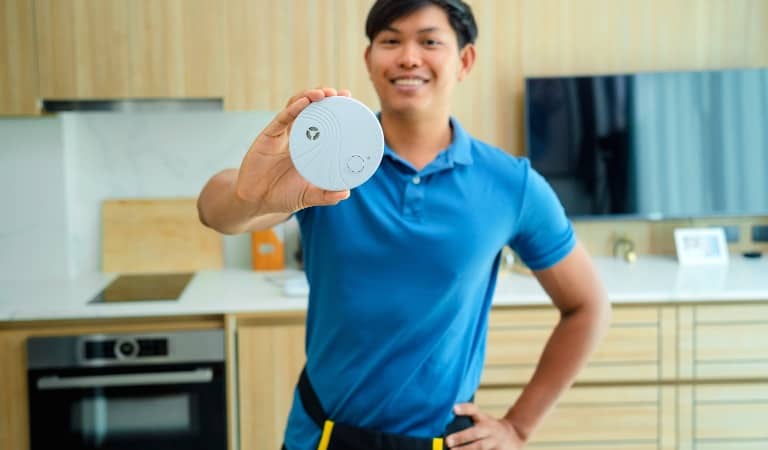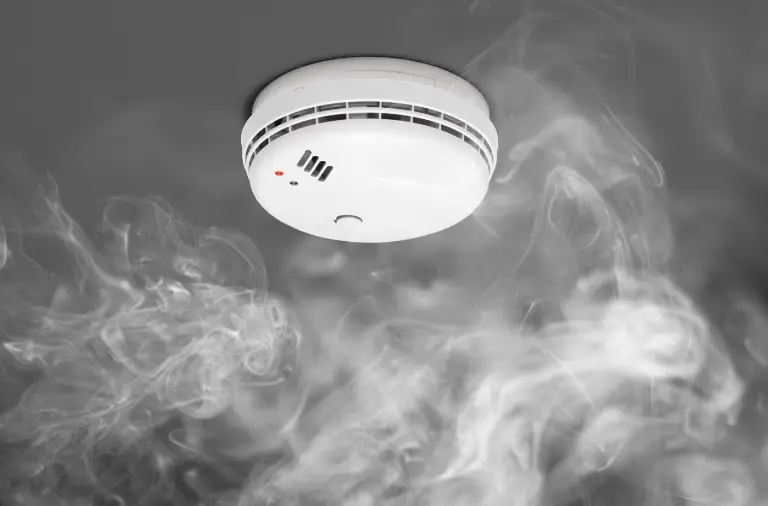Are you a tenant renting a property and wondering who is responsible for the smoke detectors in rentals? You’re not alone! This is a common question, and it’s crucial to understand the responsibilities of both landlords and tenants regarding fire safety.
The smoke and carbon monoxide alarm regulations can be a bit complex, but don’t worry – we’ve got you covered. In this post, we’ll delve into the legal requirements, the types of alarms needed, and where they should be placed.
Contents
- Who Is Responsible for Smoke Detectors in Rentals?
- What Are the Regulations Regarding Smoke and Carbon Monoxide Alarms?
- Who Should Install Smoke and Carbon Monoxide Alarms in Rented Homes?
- Types of Smoke Alarms
- Types of Smoke Detectors Essential for HMO’s
- Summary
- FAQ’s
- 1. Who is responsible for installing smoke detectors in rental properties?
- 2. Are carbon monoxide alarms also required in rental properties?
- 3. Can tenants be held responsible for maintaining smoke detectors in rentals?
- 4. What are the smoke and carbon monoxide alarm regulations in the private rented sector?
- 5. How often should smoke and carbon monoxide alarms be tested in rental properties?
- 6. Do the regulations specify the type of alarm required for rental properties?
Who Is Responsible for Smoke Detectors in Rentals?
Landlords are responsible for installing and maintaining functional smoke detectors on every floor of rental properties, including houses, apartments, and cosy bungalows.
As a seasoned landlord, I can attest to this duty. However, tenants also play a vital role in this safety routine, ensuring the smoke or carbon monoxide alarm still functions.
Tenants should regularly test the alarms, listening for that distinctive, piercing sound that signals all is well. Remember the batteries, too! Check and replace them regularly to keep your smoke detectors in prime condition.
In essence, landlords and tenants share responsibility for smoke detectors. This partnership ensures a safe and secure living environment for everyone.
What Are the Regulations Regarding Smoke and Carbon Monoxide Alarms?
Fire safety in rental properties is vital to being a landlord and understanding smoke detector regulations can save lives. With experience as a landlord, I can attest to the importance of these rules.
The Smoke and Carbon Monoxide Alarm (England) Regulations 2015, which took effect on 1 October 2015, made it mandatory for landlords to install smoke alarms and carbon monoxide detectors in their rental properties. This law emphasises these safety measures’ crucial role in shielding occupants from fire and gas-related hazards.
Landlords must install smoke detectors on every floor of their rental property, whether a large house, a small apartment, or a charming maisonette. At least one smoke detector is required on each floor to provide early warning during a fire.
Carbon monoxide detectors are also essential in rooms with solid fuel-burning appliances, such as gas boilers, wood stoves, or fireplaces. These silent guards detect odourless carbon monoxide, adding an extra layer of safety.
While compliance is a legal requirement, it’s more than just a duty. It’s a commitment to protect everyone in your rental home. So, adhere to the rules, regularly test those alarms, and rest easy knowing you or your tenants are safe.

Who Should Install Smoke and Carbon Monoxide Alarms in Rented Homes?
Landlords are legally responsible for installing smoke and carbon monoxide alarms. At least one smoke alarm on each storey is required, and a carbon monoxide alarm must be installed in any room containing a solid fuel appliance. Additionally, a heat alarm in kitchens can enhance safety.
These alarms must be in working order at the start of each new tenancy. Landlords must also test the alarms to ensure they are functioning correctly.
While regulations require landlords to install alarms in the private rented sector, regulations do not stipulate the type of alarm. Therefore, landlords can choose the best alarms for their properties.
However, they must ensure a carbon monoxide alarm is installed in any room with a potential source of carbon monoxide. Tenants must also take responsibility for the alarms’ maintenance once informed of their location.
If landlords fail to comply with these regulations, they could face penalties and compromise the health and safety of their tenants.
Types of Smoke Alarms
Landlords can choose the alarms that best suit their properties based on cost, durability, and compatibility with other security systems.
I use the FireAngel ST-622 Smoke Detector Alarm from Amazon, for my own home and my rental properties. It comes with a 10 year lifespan battery, which will never need replacing.
The required standard for landlords includes alarms that meet either the British Standard (BS EN 14604:2005) or the European Standard (BS EN 14604:2005) and display a ‘CE’ symbol. It’s crucial to understand that the type of alarm necessary can vary depending on the property and its specific requirements.
In England and Wales, regulations mandate smoke and carbon monoxide alarms in the private rental sector, while regulations differ in Scotland and Northern Ireland. Mains-connected alarms are not obligatory except for areas where regulations apply. Houses in Multiple Occupation.
Careful selection and installation of smoke, heat, and carbon monoxide alarms are essential for fire and carbon monoxide safety in rental homes. Innovative smart alarms with advanced features are now available in addition to traditional alarms.
These cutting-edge devices emit alerts and send notifications to smartphones, enabling tenants to respond promptly even when not at home. Some smart alarms can even integrate with home automation systems, providing tenants with an extra security layer and convenience.
Landlords can boost safety measures and enhance tenant satisfaction by incorporating these modern technologies into their rental properties.
Types of Smoke Detectors Essential for HMO’s
Houses in Multiple Occupations (HMOs) have strict safety regulations, especially regarding fire safety. Multiple tenants share the space, making the need for reliable smoke detectors crucial.
One of the most important safety measures for HMOs is the installation of interconnected smoke alarms. These alarms all sound off at once if one detects smoke. This ensures that every occupant is alerted in a fire emergency, providing an early warning that could save lives.
Photoelectric smoke detectors are also highly recommended for HMOs. They are great at detecting smouldering fires, a common cause of residential blazes. These can be caused by overheated electrical wiring or smouldering upholstery.
Landlords can significantly improve their tenants’ fire protection levels by installing interconnected photoelectric smoke alarms. While these detectors may require an initial capital outlay, the value they provide regarding safety is priceless.
Adhering to safety mandates within shared living spaces like HMOs is not just about compliance. It also shows a strong commitment towards tenant welfare and high safety standards. By prioritising the installation of suitable smoke detection systems, landlords can ensure the safety of their tenants and protect their investments.
Related Articles
What Are The Legal Responsibilities Of A Private Landlord?
Are Tenants Or Landlords Responsible For Bleeding The Radiators?
Is The Landlord Responsible For Fixing A Washing Machine?
Summary
Regarding fire safety in rental properties, landlords and tenants must work together.
It’s a vital responsibility that affects everyone’s well-being. So, what’s the landlord’s role?
They must ensure that functional smoke and carbon monoxide detectors are set up in all required areas, following all local laws and guidelines. Tenants play a crucial part, too.
They should regularly check the alarms and quickly tell their landlords about any problems. To make rental properties safer and potentially save lives, both parties must collaborate and pay close attention to fire safety.
Moreover, local fire and rescue services can provide valuable guidance and support in this joint effort.
FAQ’s
1. Who is responsible for installing smoke detectors in rental properties?
t is the landlord’s responsibility to ensure that working smoke alarms are installed in rental properties. This is a legal requirement to ensure fire safety in rented homes in many areas. Landlords must have at least one smoke alarm on each property storey.
2. Are carbon monoxide alarms also required in rental properties?
Along with smoke alarms, carbon monoxide detectors are also required in rental properties, especially where there are fuel-burning appliances. Landlords must ensure that both smoke and carbon monoxide alarms are in working order to protect tenants from potential dangers.
3. Can tenants be held responsible for maintaining smoke detectors in rentals?
While tenants can test smoke alarms to ensure they are working, the landlord has the ultimate responsibility for installing and maintaining smoke and carbon monoxide alarms. The landlord must replace the batteries and address any issues immediately.
4. What are the smoke and carbon monoxide alarm regulations in the private rented sector?
Smoke and Carbon Monoxide Alarm Regulations 2022 require landlords to ensure that working smoke and carbon monoxide alarms are installed in rented properties. Failure to comply with these regulations can lead to penalties and jeopardise tenants’ health and safety.
5. How often should smoke and carbon monoxide alarms be tested in rental properties?
It is recommended that landlords and tenants test smoke and carbon monoxide alarms at least once a month to ensure they are functioning correctly. Regular testing helps maintain fire and carbon monoxide safety in rental homes.
6. Do the regulations specify the type of alarm required for rental properties?
The regulations usually do not stipulate a specific type of alarm, but it is essential to have working smoke and carbon monoxide alarms in rental properties. Depending on the property’s layout and potential hazards, landlords may choose the appropriate alarm type.

